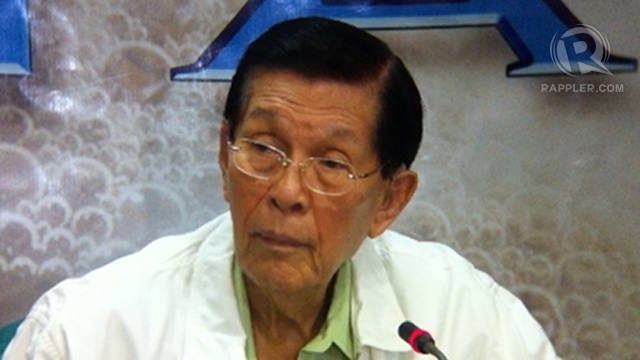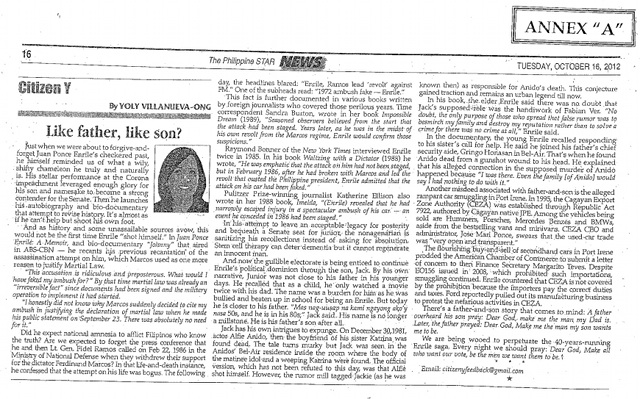Unsettled issue
A law each day(KEEPS TROUBLE AWAY) By Jose C. Sison (The
Philippine Star) | Updated January 23, 2013 - 12:00am
Does the nullity of a reconstituted lost certificate of title settle
the issue of ownership of the property covered by said title? This is the
question answered in this case between Nora and the spouses Montes.
Nora
was the registered owner of 11 adjacent lots covered by TCT Nos. 72654 to
72664. However, the owner’s duplicates of said titles were not in her
possession. So she reported to the Register of Deeds that she lost the owner’s
duplicate copies of said TCTs and at the same time filed a petition for the
issuance of new owner’s copies before the Regional Trial Court (RTC).
After
due notice and hearing the RTC granted Nora’s petition. Hence, new copies of
the 11 TCTs were issued to Nora pursuant to Section 129 of the Land
Registration Act.
It
turns out however that the TCTs were not actually lost but were in the actual
possession of the spouses Montes. So when they learned that new TCTs were
issued in the name of Nora, they filed with the RTC a petition for relief from
judgment asking that the new owner’s duplicate copies of the 11 TCTs be
declared null and void.
The
spouses claimed that they had actual possession of the owner’s copies of the
TCTs which had been declared lost and cancelled. They alleged that Nora had
sold the lands covered by the TCTs to a certain Mr. Lazo before it was
subdivided into 11 lots. They further alleged that when Mr. Lazo subdivided the
land into 11 lots, the titles remained in the name of Nora because Lazo lacked
funds to transfer them in his name. On March 21, 2006, Lazo sold the 11 lots to
them and gave them the 11 copies of the TCTs. They said they discovered the RTC
decision ordering the issuance of new owner’s copies to Nora when they tried to
register the properties in their names, thus prompting them to file this
petition for relief from judgment.
The
RTC granted the petition of the spouses and restrained and prohibiting the
Register of Deeds from accepting/registering any document executed by Nora and
any person authorized by her that will in any way encumber or cause the
transfer of the property covered by the 11 TCTs. The RTC also set aside its
decision granting Nora’s petition for reconstitution of titles and instead
dismissed said petition. It also declared as null and void, the new owner’s
TCTs in the name of Nora. The RTC said that “when the original owner’s copy of
the title is not lost but is in the possession of a new owner, being the
alleged buyer, it did not acquire jurisdiction over Nora’s petition for the
issuance of new owner’s copies of the eleven TCTs. Was the RTC correct?
Opinion ( Article
MRec ), pagematch: 1, sectionmatch: 1
Yes.
It is judicially settled that a trial court does not acquire jurisdiction over
a petition for the issuance of a new owner’s duplicate certificate of title if
the original is in fact not lost but in the possession of the alleged
buyer. Such reconstituted certificate is itself void once the existence
of the original is unquestionably demonstrated. Nonetheless the nullity of the
reconstituted certificate does not by itself settle the issue of ownership over
the property; much less does it vest such title upon the holder of the original
certificate. The issue of ownership must be litigated in appropriate
proceedings. It cannot be determined in an action for the issuance of a new
owner’s duplicate certificate of title or in proceedings to annul such newly
issued certificate.
In
this case, the RTC did not decide the issue of ownership when it permanently
enjoined the Register of Deeds from accepting or registering any kind of
conveyance that may be executed by Nora to any person except as to the spouses
Montes. It did not declare that the spouses Montes are the new owners of the
properties. The spouses Montes’ possession of the 11 TCTs is not necessarily
equivalent to ownership of the lands covered by the TCTs which must be
litigated in another appropriate proceeding. This case is similar to the ruling
in the case of Espino vs. Spouses Bulut, G.R. 183811, May 30, 2011.
*
* *
E-mail:
attyjosesison@gmail.com


